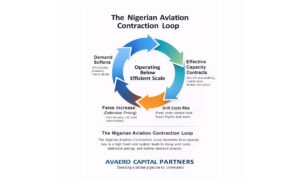The Business Case for Reducing Airline Delays and Cancellations
In 2024, Nigerian airlines operated with an average on-time performance (OTP) of just 48.2%. This means that more than half of all domestic flights were delayed—an outcome that continues to frustrate passengers, impact reputations, and drain operational resources. While most airlines in Nigeria acknowledge OTP as a performance indicator, few are capturing its true economic value—or the opportunity cost of underperformance.
This gap between recognition and action has become a strategic blind spot in African aviation.
At Avaero Capital Partners, we believe OTP should be treated not as a secondary operational issue but as a primary business performance lever—one with direct implications for cost control, customer retention, and future growth.
OTP Isn’t Just About Punctuality—It’s a Financial and Strategic Asset
Globally, OTP is a cornerstone metric for successful carriers. The average global OTP in 2024 was 83%, according to Cirium, with Middle East and African airlines averaging 83.1%, and even low-cost carriers exceeding 80%. In comparison, the Nigerian average of 48.2% reflects a significant structural gap.

But OTP is not just about punctuality—it has direct bottom-line implications. Delays lead to:
- Higher fuel consumption on the ground
- Crew overtime and disrupted duty rosters
- Missed connections and reactive aircraft swaps
- Customer service costs, reaccommodation, and reputational damage
Every minute of delay comes with a cost. Globally, the estimated cost of a single minute of aircraft delay ranges between $75 and $100, depending on aircraft size, location, and operational complexity. For a market like Nigeria, where margins are thin and operational reliability is already a customer concern, these costs accumulate quickly.
Every Airline Has an OTP Committee—So Why Aren’t the Numbers Improving?
Most Nigerian airlines already have an OTP or Performance Review Committee, some even meet daily. These typically include representatives from flight operations, ground handling, crew scheduling, engineering, and airport management. On paper, the right structures are in place.
The real problem lies in implementation and tracking.
- Delay causes are often manually entered, inconsistently coded, or not investigated at all.
- Accountability is unclear—each department deflects rather than owns recurring issues.
- Performance reviews are held, but without data, benchmarking, or actionable follow-up.
In contrast, leading carriers have OTP integrated into performance dashboards, executive reporting, and even staff incentives. They don’t just report delays—they interrogate and mitigate them.
What’s the Business Case for Improving OTP in Nigeria?
Using conservative assumptions from actual 2024 operational data, the economic uplift from improving OTP by just 10 percentage points (e.g. from 48% to 58%) could exceed:
| Uplift Category | USD | NGN |
| Delay Cost Savings | 32,640,000 | 45,696,000,000 |
| NCAA-Based Disruption Compensation | 28,401,600 | 39,762,240,000 |
| Crew Cost Savings | 8,160,000 | 11,424,000,000 |
| Missed Connection Cost Avoidance | 88,425,600 | 123,795,840,000 |
| Customer Loyalty Revenue Uplift | 6,600,000 | 9,240,000,000 |
| Total Estimated Uplift | 164,227,200 | 229,918,080,000 |
These estimates are based on realistic aircraft utilisation, NCAA compensation limits (₦45,000 per pax for delays over 6 hours), and passenger volumes typical of Nigerian domestic operations.
Why It Matters Now
African aviation is approaching a tipping point.
Passenger volumes are rising. New airlines are entering the market. Investors are becoming more selective. Passengers—especially business travellers—are growing less tolerant of unpredictable schedules. Meanwhile, regulators such as the Nigerian Civil Aviation Authority (NCAA) are stepping up compliance expectations around passenger rights, delay reporting, and compensation.
Reliability will increasingly differentiate investable airlines from those that struggle to scale.
A Framework for Improvement
Improving OTP doesn’t require massive capital investment. It requires clarity, consistency, and a strong internal mandate.
Here’s how leading carriers tackle it:
- Elevate the Role of OTP Committee
• Give it authority to recommend operational changes—not just to review data.
• Rotate committee chairs by function to avoid finger-pointing and encourage shared ownership. - Automate Root Cause Tracking
• Use digital tools to track real-time delays and assign standardised codes.
• Link delay events to accountability units (e.g. maintenance, fuel, baggage) and measure recurrence. - Run a Performance Pilot
• Focus on one hub (e.g. Lagos) for 3–6 months.
• Track baseline delay frequency, implement fixes, and report uplift. - Tie OTP to Incentives
• Align OTP improvements with staff bonuses and vendor SLAs.
• Celebrate department-level progress publicly. - Report Uplift Like Revenue
• Translate OTP improvements into financial value for executive reports and board reviews
OTP Improvement Is a Path to Profitability
OTP isn’t a cosmetic KPI. It’s a strategic advantage, especially in highly competitive regional markets.
A carrier that operates with 60–70% OTP doesn’t just move planes on time—it builds trust with passengers, improves aircraft and crew utilisation, and earns a stronger position in bilateral negotiations, codeshare agreements, and investor dialogue.
And critically: it lowers costs without raising fares—a key consideration in price-sensitive markets like Nigeria.
OTP improvement is the lowest-hanging fruit in airline operations today. Nigerian airlines already have the structures in place. What’s needed now is execution—driven by leadership, tracked with precision, and connected to financial outcomes.
For airlines seeking to scale, attract investment, and compete globally, OTP is not optional—it’s foundational.
Disclaimer: The insights shared in this article are for information purposes only and do not constitute strategic advice. Aviation markets and circumstances vary, and decisions should be based on your organisation’s specific context. For tailored consultancy and guidance, please contact info@avaerocapital.com.




